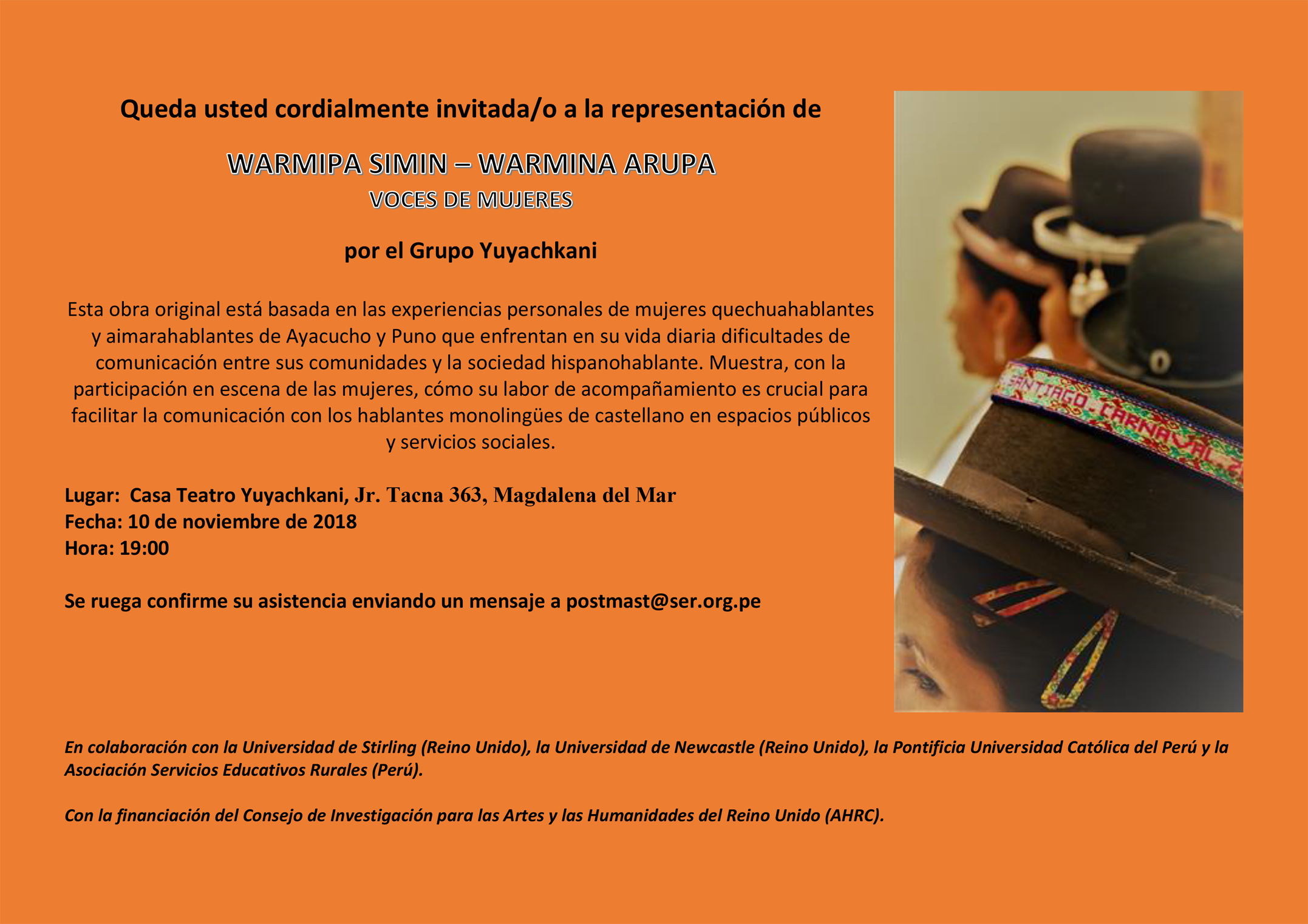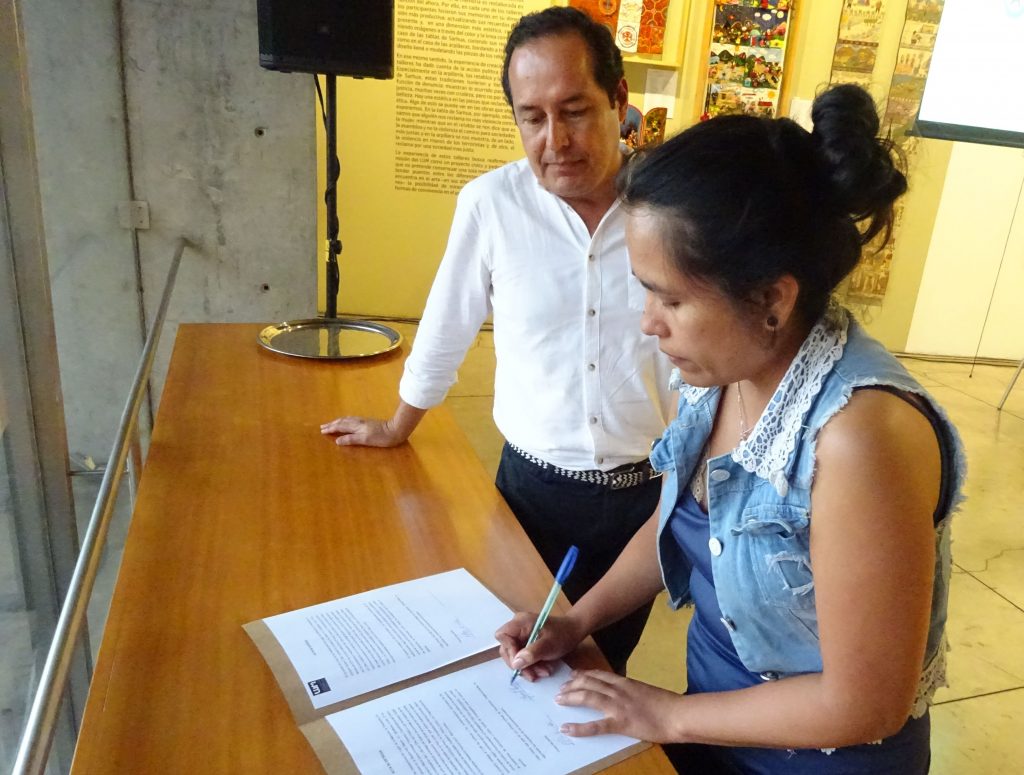Activities and events
Scoping forum with the female indigenous leaders – Ayacucho, Thursday 1 and Friday 2 March 2018
At the beginning of March, the female indigenous leaders from Ayacucho and Puno who participate in the project came together in the city of Huamanga for two days to get to know each other and share their experiences. Luis Andrade, Raquel de Pedro Ricoy and Raquel Reynoso facilitated the event.
Around twenty people participated in the forum, organized by Asociación SER Ayacucho, with the objective of defining the priorities of the female indigenous leaders relating to the theatre play, the exhibition and the training materials that were planned in the framework of the project. This objective was fulfilled through role plays, group discussions and individual presentations.

During the meeting, the female indigenous leaders came to the realisation that they face very similar challenges when they mediate linguistically and culturally to support the rights of their fellow indigenous citizens in their encounters with representatives of public and private institutions.
They also stressed that the work they do not only involves translating content from one language to another (Quechua-Spanish and Aymara-Spanish), but also mediating between cultures and different worldviews.
The spontaneous exchange of knowledge about the cultures of Ayacucho and Puno was an important part of the meeting, as was the process of gaining an awareness about the varieties of Quechua and Aymara spoken in either region. After the meeting, the women from Puno went for a walk in the district of Quinua, famous for its crafts, accompanied by some Ayacucho female leaders.
Field visits to the indigenous leaders in Ayacucho and Puno
In March and April 2018, Rosaleen and Luis made two field visits to the indigenous women leaders in their home communities, in order to talk to them about their professional lives and record their experiences of working as linguistic and cultural mediators on behalf of their fellow community members. Lee Bendezú accompanied us as cameraman, taking the still photos and recording the videos on which the stage play and audiovisual exhibition would be based. In both locations, regional representatives of SER assisted us with coordination withthe women leaders: Yolanda Yaranga Ojeda in Ayacucho and Soledad Rosario in Puno.
Trip to Ayacucho, 23-27 March 2018

In Ayacucho, we met with some of the leaders in the city itself (Sat. 24 March). Some of them came to our hotel where Lee set up a space for the video recording in the garden. As we filmed each woman in turn, the others were gathered in the hotel restaurant over refreshments and having lots of chat. In this way, we interviewed Lina Mendoza, Margarita Soto, Julia Alanya, Clelia Rivero, Alina Morote and AnaCoras. We then jumped into a taxi and went to Nelly Mejía’s house, where we interviewed Nelly and Olga Calderón. Zoila Gamboa was unable to join us on this occasion,and we recorded her testimony when she came to Lima in November 2018 to take part in the stage play.
On Easter Sunday 25 March we took time out to enjoy the Ayacucho Easter Parade, a colourful and well-orchestrated spectacle that we watched from a restaurant balcony overlooking the Plaza de Armas.
On Monday 26 March we hired a chauffeured car and were driven out to the Quechua communities of Putacca and Paccha, both located in the District of Vinchos, Huamanga Province.The road was shrouded in mist as we drove higher through the hills. We arrived around 9 am in Putacca where Reyna Quispe Cuba met us. Reyna led us first to her mother’s house where her mother served us a welcome breakfast of broad beans, fresh cheese and corn on the cob (choclo)with a cup of mint tea (muña). After that, we set up the recording against the backdrop of Putacca’s ripening crops of potatoes and beans.
From Putacca we drove back in the direction of Ayacucho, down through stunning rocky landscape to the small town of Paccha, where Clotilde Silva met us in the square. Clotilde asked us to film her in front of the fine colonial style church dedicated to the Virgin of Cocharcas, which dominates the town. The church has been reconstructed following its destruction in an earthquake in March 1980, the same year that Shining Path arrived in the town with fatal consequences. Other notable features of the square are its colonial stone water fountain and the Peace monument erected to mark the reconciliation process.
Every woman that we talked to in Ayacucho, in addition to commenting on their more recent experiences of community mediation, had painful and vivid memories of the atrocities suffered by their families and communities during Peru´s internal war (1980-2000). Some of them showed considerable bravery in bringing these memories to the surface and articulating them in front of the camera. In November 2018 we reviewed the recordings with each of them individually, to ensure that they were happy for their testimonies to be publicly displayed.Those who had shown emotion during the filming all confirmed that they wanted this to remain on record, so that the public would see that they were strong women who also felt human suffering that they were not afraid to reveal.
Trip to Puno, 6-8 April 2018

We arrived early in the morning of 6 April, to be met by Soledad and driven by chauffeur Darwin to the Quechua speaking region of Puno department, north of Lake Titicaca. We reached the District capital of Ayaviri where we met with Adelma Quispe Condori. Adelma led the way out to the family homestead of Ñactuiri where she had grown up. Being in this place, surrounded by the mountain guardians (apus), brought back many memories for Adelma, which she talked about in her interview. When the recording session was over, Adelma said a prayer to each of the apus, blowing on a bundle of three coca leaves (k’intu)in their direction as she spoke. She remarked that the conversation should not just be between her and us the researchers, but that the apus also had to be acknowledged and thanked.
On Saturday 7 April we set off again with Soledad, Darwin at the wheel, south from Puno city towards Acora and the Aymara speaking region. In Puno we picked up María Yolanda Crisisto and in Acora we collected Bertha Asqui Juárez from the market around 8.30 am. We then drove through the high moorlands of Puno province,crossing many rivers, low at this time of year. We saw Andean wading birds as well as herds of llama and alpaca. We arrived after some two hours at Bertha’s homestead of Aquechía Nazaparco, where we filmed her testimony. From there we set off for Sacuyo, driving through dramatic rocky landscape until we reached Yolanda’smother’s house high on the moorland plain. We exchanged greetings and some gifts of food with her mother and recorded Yolanda’s testimony against the backdrop of volcanic cliffs. From Sacuyo we set out again towards the house of Norma Ajrota Inquilla, who lives in Ancasaya, district of Ilave, crossing from Puno province to the province of El Collao, arriving about 3.40 pm. Norma offered us a dish of quinoa soup and we recorded her testimony amid the landscape around her home. We left her at around 4.45 pm and got back to Punoat 6 pm, having driven some 120 km.
This journey gave us many insights into the lives of the women leaders, their strength and courage, the way in which they organise themselves productively in their communities, and the difficulties of their daily lives.
Events
Stage play production – Lima, 10 November 2018
Grupo Cultural Yuyachkani presents: WARMIPA SIMIN – WARMINA ARUPA (VOCES DE MUJERES) (WOMEN’S VOICES)
This original multilingual play is based on the personal experiences of Quechua-speaking and Aymara-speaking women from Ayacucho and Puno who face difficulties in communication between their communities and Spanish-speaking society in their daily lives. It shows, with the participation in the scene of these women, how their accompaniment is key in facilitating communication with monolingual speakers of Spanish in public spaces and social service settings.
The audiovisual recording of the play was subsequently shown in Ayacucho and Puno.

Exhibition – Lima, 6 December 2018 – 31 June 2019
The Lugar de la Memoria, la Tolerancia y la Inclusión Social (LUM) (Place for Remembrance,Tolerance and Social Inclusion) hosted an exhibition of audiovisual (video-recordings and photographs) materials, which included testimonials. The protagonists were the women who participated in the project.

The opening of the exhibition coincided with the third anniversary of the LUM. The occasion was marked by a reception attended by dignitaries, civil servants and members of the public, The LUM organised cultural events around the exhibition until it closed.
After the exhibition closed, SER, in collaboration with LUM, organised an itinerant exhibition with the audiovisual materials, which was exhibited in the provinces.
This reached new audiences who do not have first-hand experience of the issues that indigenous women face in their daily lives or of the role of the social interpreters, as well as people who are familiar with them.

Digital repository
A digital repository of audiovisual materials is hosted in the LUM archives. The materials include first-hand accounts provided by the female indigenous interpreters. The researchers, in conjunction with SER, facilitated their production. The public, free-access repository is curated by LUM and SER.
Training materials
Video-recordings of a set of materials (e.g. simulations of mediated situations, talks by experienced indigenous interpreters) that can be used in the training of new female indigenous interpreters will be facilitated by the researchers, in collaboration with SER. This set of materials will address the main challenges that they are likely to face and possible ways of overcoming them, as well as have an impact on ensuring the sustainability of their role.
This set of materials will be part of the digital archive hosted by LUM.


